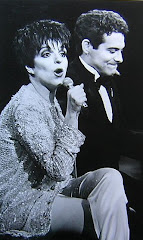It’s 11:30 p.m. on a freezing cold night in Woonsocket, Rhode Island, but Liza Minnelli is cozy at the 24-hour Patriot’s diner, with its retro bread ads pinned to the wall and a teenage waitress who calls everyone “hon.” Minnelli orders tea, then chicken soup to take back to her room. Her stomach is acting up, she explains to her director, and she turns to me. “I have so much trouble losing weight,” she says, petting her abdomen. “But I’ve lost 35 pounds just doing this show.”
Liza’s cast and crew all adore this diner. It’s become their hangout during this week of out-of-town tryouts. In only two days, they move to New York, where Liza’s at the Palace opens on December 3 for a limited Broadway run. Beneath the surgical diner lights, Liza’s black eyes fill her face. Her skin is tight and coated in a layer of orange stage base. But even exhausted, at age 62, and after decades of medical nightmares—her grueling recovery from encephalitis in 2000, the vocal-cord surgery, five miscarriages, two hip replacements, the drugs, the alcohol—she looks surprisingly good, back to that beautiful spider’s body: the cubelike high-up torso and crazy-skinny limbs.
Slouched in a red hoodie, she leans against her director, Ron Lewis, occasionally whispering in his ear. Billy Stritch, her pianist, turns to Liza to apologize. I can’t tell exactly what their dispute was, but it sounds as if she’d pushed him to change an arrangement; he’d gotten irritated. “I’m so sorry, I was wrong!” he says. “You just wanted to make it better. I want it to be better.” She leans over and cuddles Stritch like a cat, resting her head against his shoulder. In this crew, there are many cuddles and caresses. From the musicians to the dancers and Ron Lewis, these men have known Liza for 16, 20, 35 years. Three of the four chorus boys—Cortés Alexander, Jim Caruso, Tiger Martina—are over 40.
As grilled cheese sandwiches and hot cocoa arrive, the “boys” reminisce about the raucous sing-alongs they used to have, parties at Liza’s old place in L.A., with a peculiar meld of celebrities and civilians. Esther Williams, Quentin Tarantino, and Janet Jackson come up. “I remember Esther singing to you!” says Stritch, lounging on Liza’s shoulder and doing a campy, drawling impression of a not entirely coherent Williams, boozy with love. “I don’t know why I love you, baby. Baaaby, I knew your mother! I don’t know why I love you, baby, I don’t know why … I’m aliiiive!” Everyone giggles. They love gallows humor here.
We all admire the waitress. “She’s about 8,” marvels Liza.
Ron Lewis reminds Liza about her appearance on Rosie O’Donnell’s new variety show, which is coming up in four days. They need to rehearse.
“You know Rosie’s show is live, right?” asks one of her dancers.
“It’s live?” Liza asks, looking alarmed. “What kind of show is this?”
Reassured that it’s an old-style variety gig, an experimental pilot for a possible series, she begins to brainstorm, rewriting the patter that’s been written for her. In the original script, Rosie complains that she lacks the skills to do a big New York number. Liza appears, wisecracking, “Maybe I could help?”
“Doesn’t that sound too snarky?” she asks. Instead, Liza decides to tap Rosie on the shoulder, announcing, “I’m here to do the big New York number!” and she muses about adding something else, something showbizzy and affirmative, in her own voice. “And youcan do it, and I’ll show you how!”
Everyone agrees that tonight’s show went well—the venue was packed, and Liza’s energy was great. They recall a charming moment of spontaneity, when the microphone stand collapsed and Liza had to call the cute stagehand to fix it.
“I had to stop myself from saying, ‘I’ve seen that act before,’ ” says Liza.
Everyone giggles naughtily.
“I’ve seen that marriage before,” riffs Caruso.
“I’ve seen that husband before,” says Stritch.
It’s the only even implicit mention in my company of Liza’s ghoulish ex, David Gest, the lawsuits, that circus of a wedding, the accusations of vodka-fueled abuse—the whole glitter-horror of Tabloid Liza that does not exist inside this warm circle. Liza alludes to it in her act early on, a homeopathic dose for an audience well versed in her biography, from teen Tony winner to the glamorous heyday of Cabaret, from the Studio 54 decadence to these scary last few years, when fans feared their diva was headed for a Judy-style, reality TV–inflected implosion. “I’m known for doing songs about falling in love,” she says, very arch, leaning against the piano. “But lately, I find I’ve been drawn to songs about falling out of love. In my very expensive research— ” She moves on, but the point has been made: I’ve acknowledged it, it’s over. Then she does a comic performance of “If You Hadn’t But You Did,” complete with a pantomime of a woman shooting her husband.
The show is an opportunity for her to send a message, a basic and beautiful show-business message—I’m still here. I can do it. And I’ll show you how. Before she leaves the diner, she takes me by the shoulders, pulls me in, and stares with alarming depth straight into my eyes, as if trying to hypnotize me. “We’ll see each other in New York, right? We’ll be friends forever?”
Earlier that day, Liza and I meet in a bare hotel room. On the glass coffee table, her assistant sets up a bottle of Coke, an ashtray, and a pack of cigarettes. There’s a NO SMOKING sign outside the door, but who cares. Liza’s an elegant smoker; when she crosses her legs and dangles a hand down and the smoke rises, it makes me want to light up. And I don’t even smoke.
I compliment her on her red socks. “Thanks. I couldn’t find black ones, so I said, Oh, screw it. I feel vaguely like Van Johnson.”
According to Liza’s press agent, by the terms of their settlement, Liza can’t even speak David Gest’s name, like Voldemort. Whenever I tiptoe near these topics, her lips press shut, her eyes darken. But just in case you’re wondering, she doesn’t seem even mildly crazy. She’s warm, cagey, girlish. Brash laugh, throaty voice. When we discuss her impressive physical rehabilitation, she pulls up her pants leg and reaches out and grabs my hand. “Feel this!” she says, running my fingers up the thick beige scar on her knee. “Nice, huh? Wire.”
Her current show is a nod to her mother’s performances at the Palace back in 1952, a legendary seventeen-week run; it’s Liza’s first time back on Broadway since Minnelli on Minnelli in 2000, which also ran at the Palace, but she’s been doing the show around the world for two years, tweaking it as she made her way through Antwerp, Uruguay, and Helsinki. The real labor of love here is the second act, Liza’s homage to Kay Thompson, her godmother. If you’ve heard of Thompson at all, it’s because she wrote the Eloise children’s books, or perhaps for her role as the “Think Pink!” editor in Funny Face. But to those who knew her, Kay Thompson is a thrilling showbiz secret, a kind of skeleton key to mid-century Broadway and Hollywood: pioneer musical arranger, radio star, cabaret performer, and all-around eccentric aesthete, the model for Liza of the defiant creative survivor.
Liza’s fans share an understanding that things can only go very, very badly or magically well.
“She was this funny, serene force,” Liza tells me of Thompson and her influence on Liza’s childhood. “I remember once we were walking around in New York, I was about 4, and she had a big wolf coat, gray, just heavenly looking—she was so tall and thin. She stopped by the Stork Club. This very nice black gentleman opened the door, and she asked for Mr. So-and-So, and the man wasn’t in. And she said, ‘Yeah, well, just tell him that Miss Thompson and Miss Minnelli stopped by.’ And my world changed! I was Miss Minnelli.”
When she was 22, Minnelli spent a month studying Russian ballet, poring over Nijinsky with Thompson at her apartment at the Plaza. “We also went through a whole period when we studied haiku.” After Thompson was kicked out of the Plaza (she’d stayed rent-free for many years), she moved to Rome, then spent her last ten years in Minnelli’s apartment, wheeling about in elaborate turbans, riffing scat verses at her visitors, until she died in 1998, somewhere in her nineties. (She’d made up so many stories, no one knew her true age.)
As Liza describes the way she begged Ron Lewis to come be her director to reenact Kay’s act, he opens the hotel door.
“Hi baby! I’m braggin’ on ya.”
“You look great,” he says.
“I feel great,” she says.
We all continue happily chatting about that whole lost glamorous world—Liza’s stories are studded with visits to Noël Coward’s house in Switzerland, memories of the time that Charles Aznavour and Liliane Montevecchi snuck her into a Las Vegas show. Only when I mention Kay Thompson’s early rejections does the mood chill slightly. Thompson had a peculiar, acerbic charisma, I suggest—to some tastes insufficiently va-va-voom? Liza shakes her head: No, no, no.
“Oh, no, she conquered everything, then moved on,” Liza tells me. “She was the greatest person ever at MGM, then she got tired of that. She did a nightclub act that was the greatest nightclub act that had ever been seen, then she got tired of that. Then she wrote the best children’s book in the world. She lived her life! Anybody who knew her was lucky— ”
“Worshipped her,” adds Lewis.
“They worshipped her. Because she was unique.”
I explain that I was just referring to the musical Hooray for What!, where Thompson met Liza’s father, Vincente Minnelli. She was fired before the show hit Broadway—an event so humiliating she vowed never to do Broadway again and never spoke of it.
“It was a musical that neither of them liked,” Liza says with a shrug. “And if Kay didn’t like somethin’, she said it’s silly for her to do it. And I understand.”
I move on myself, asking about another member of Liza’s self-created family: her drummer Bill Lavorgna, a beloved band member for many years. She called him Pappy, and he died last year.
“He was wonderful,” Liza says. “I knew him from the time I was 13. In fact, he caught me driving when I wasn’t supposed to be!”
This was in Las Vegas, says Liza. “Momma was there divorcing somebody, right? So I took the car. And I was just driving because, you know, because I could drive. And I’m driving along. And I’m also smoking. A fast 13, right? So I stop at a light and I look and there’s Pappy and his wife, Joan. And I think, I’m screwed. I am screwed, that’s it, I’m gonna be in trouble forever!” She grins, a big mischievous grin. “And they never told. And from that second on, we were best friends.”
This is Liza’s central definition of friendship: Friends keep your secrets, they stay on your side, even when contradictions arise. Her stories of how she met her friends are full of rescues—she called someone and he came unquestioning to her aid. And can you blame her? Judy Garland’s legend was built on a frighteningly intense vulnerability, the unhappiness of a child star fed amphetamines and forced to wear tiny disks to reshape her nose. The sob in Garland’s voice (which was shaped by Kay Thompson) made listeners desperate to soothe her sadness. She died at 47 of an overdose. In the show, Liza tells a story about giving Kay the news and Kay’s reassuring her, saying, “Your mother lived a marvelous life. She did everything she ever wanted to do.”
Liza has transformed Judy’s fragility into the theater of the eternal comeback: Her fondest fans share an understanding that things can only go very, very badly or magically well. Right now, she seems vibrant. She gets up and dances, she wriggles and literally wrestles with her choreographer, demonstrating for me the way she worked out the slapstick for her role on the sitcom Arrested Development—she refused to get a stuntwoman, she says. She was willing to do anything, as long as it was funny.
That night, I walk into Woonsocket’s Stadium Theater. Who knew this place even existed? It’s gorgeous, beautifully restored. The audience is filled with people who love Liza, who are thrilled that her voice is so strong, that she looks so good lounging in her white glittery pajamas. They go crazy for “Cabaret,” they are moved by her performance of Judy’s Palace medley, with a verse written specially for Liza. And they eat up the winking references: the way she describes three closets that Kay made for her, then says, “What’s in them, my last three husbands?”
But for my taste, the best number is Kander and Ebb’s “And the World Goes ’Round.” Liza wears a black velvet jacket with bright red cuffs; she stands still while she sings it, hands in pockets. Like many of her songs, it’s an anthem of hope and survival, but it’s hard to miss the colder, stranger theme: that no matter how bad your pain, the universe simply doesn’t care when you suffer. “And sometimes a friend starts treating you bad / But the world goes ’round! / And sometimes your heart breaks with a deafening sound.”
Two days before, I’d watched a beautiful performance of this song on an early interview with Geraldo Rivera, a raw young Liza singing it with her black hair wet against her face. “I desperately want a family,” she told Geraldo. “I really want a family. It’s important to me.” She was talking about having children, something she, like Kay, she tells me, wasn’t able to do—though like Kay, she has an extended family, of 22 godchildren. But it does seem that Liza’s somehow gotten what she wants. It’s a different definition of happiness; a marvelous life. And the world goes ’round.















































































































No comments:
Post a Comment